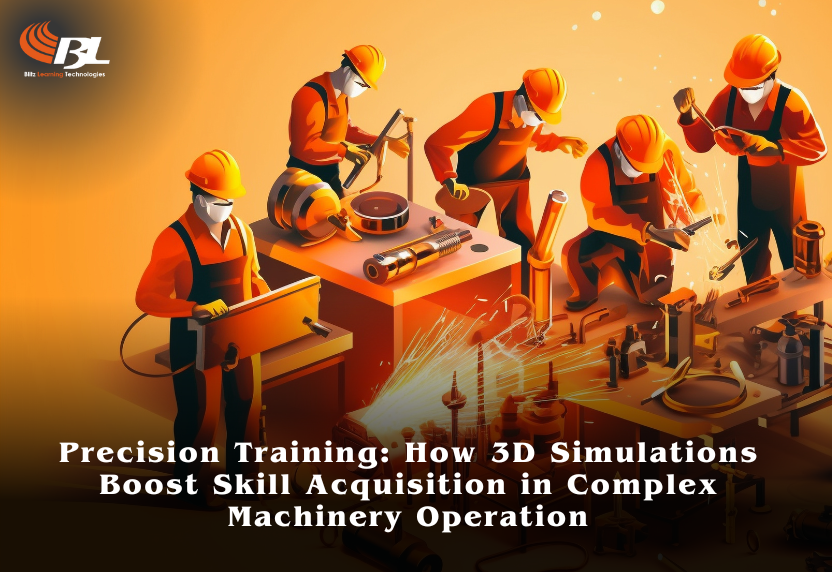
Blog
- Home
- Blog

16Jan
Precision Training: How 3D Simulations Boost Skill Acquisition in Complex Machinery Operation
Introduction
In an era where technology is revolutionizing industries, 3D simulations are proving to be a game-changer for skill acquisition and performance, particularly in operating complex machinery. These immersive simulations replicate real-world environments with stunning accuracy, enabling professionals to hone their skills in a safe, controlled, and highly interactive setting.
The Challenges of Complex Machinery Training
Training operators for complex machinery poses several challenges. Traditional methods like classroom learning or on-the-job training often fall short when it comes to replicating the high-stakes environments and nuanced scenarios that operators face. Errors during hands-on training can lead to costly damages, injuries, or downtime, making precision training both critical and daunting.
Moreover, complex machinery often involves intricate systems, detailed procedures, and swift decision-making under pressure. Mastering these requires not just theoretical knowledge but also practical experience—a gap that 3D simulations effectively bridge.
The Role of 3D Simulations in Skill Acquisition
3D simulations transform training by offering realistic, engaging, and repeatable practice opportunities. Here’s how:
1. Immersive Learning Experience
Unlike passive learning methods, 3D simulations fully immerse trainees in a virtual environment. They can interact with machinery, troubleshoot problems, and perform operations just as they would in the real world. This hands-on experience strengthens muscle memory and improves cognitive retention.2. Safe and Controlled Practice
Simulations allow trainees to experiment, make mistakes, and learn without the risk of causing harm or damage. This safety factor is particularly valuable in industries like aviation, construction, and manufacturing, where errors can have catastrophic consequences.3. Scenario-Based Training
3D simulations enable the creation of diverse scenarios that mimic real-world challenges. Trainees can practice handling emergencies, equipment malfunctions, and high-pressure situations, ensuring they’re prepared for anything the job might throw at them.4. Real-Time Feedback and Analytics
Advanced simulation platforms provide instant feedback and track performance metrics. Trainees can identify areas for improvement, refine their skills, and progress at their own pace. This personalized learning approach significantly boosts confidence and competence.Enhancing Performance in Complex Machinery Operation
The benefits of 3D simulations extend beyond skill acquisition to enhance overall performance. Operators trained through simulations demonstrate higher efficiency, precision, and decision-making capabilities. They’re better equipped to troubleshoot issues, adapt to new technologies, and adhere to safety protocols, ultimately reducing operational risks and costs.
For organizations, the ROI of simulation-based training is immense. By minimizing accidents, equipment wear and tear, and training downtime, companies save resources while ensuring a highly skilled workforce. Additionally, simulations can be tailored to specific machinery and operational contexts, making them versatile tools for diverse industries.
The Future of Training
As 3D simulation technology continues to evolve, its integration with augmented reality (AR), virtual reality (VR), and AI is opening new horizons. Future advancements will further blur the line between virtual and physical training environments, making skill acquisition more accessible, effective, and engaging.
Conclusion
Precision training through 3D simulations is reshaping how professionals learn and excel in operating complex machinery. By combining safety, interactivity, and real-world relevance, these simulations empower operators to master their craft with unparalleled accuracy and confidence. In a world that demands excellence, 3D simulations stand as a cornerstone for achieving precision and performance in machinery operations.

Neha Khare
About authorNeha Khare specializes in designing engaging and effective learning experiences tailored to learners' needs and also creates insightful blogs on corporate e-learning. She develops creative instructional methods, integrates multimedia, and aligns content with learning goals. Neha's innovative techniques and blog contributions significantly enhance the quality and impact of corporate training programs.



Leave a comments